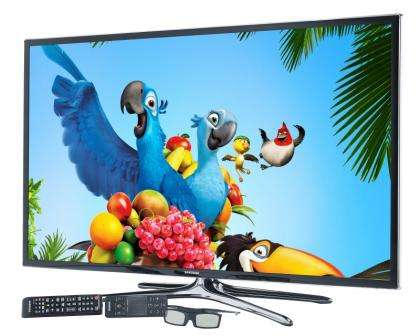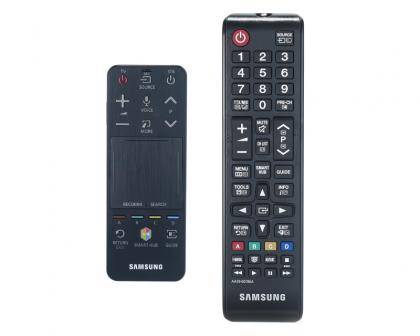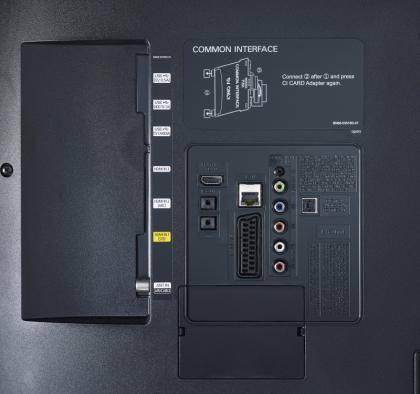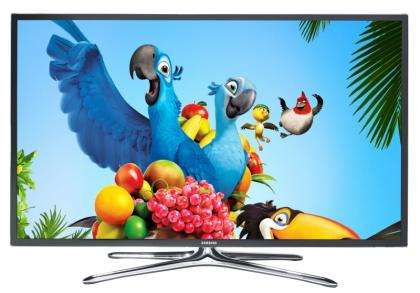For this review we tested the 40in model in the 6 Series F6400 range, but it's also available in 32in (UE32F6400), 40in (UE40F6400), 46in (UE46F6400), 50in (UE50F6400), 55in (UE55F6400), 65in (UE65F6400) and 75in (UE75F6400) screen sizes. All models have identical specifications except for their dimensions and power usage. We're confident that image quality will be practically identical across the range.
Samsung's mid-range LCD TV for 2013 comes in three versions, the F6800, the F6500 and the F6400, which we’ve reviewed here. Excepting appearances they are largely identical, though the upper two models come with Freesat HD tuners as well as Freeview HD ones. Those two are also rated by Samsung as having smoother onscreen motion, Samsung uses its own Clear Motion Rate (CMR) figure for this, which is rather opaque. The F6800 and F6500 both have a CMR of 400, compared to the F6400's 200 CMR. Despite that, we didn't see any issues with motion on this TV.
This 40in, Full HD TV supports active 3D, includes built-in Wi-Fi and can access Samsung's comprehensive selection of online services through the stunning Smart Hub interface. It also looks good thanks to a quad-leg stand that’s finished with a polished aluminium effect.

However, the 6400 lacks some of the higher-end features of the F7000 and F8000. It lacks a Freesat HD tuner, integrated camera or any form of backlight Micro Dimming, and makes do with a dual-core processor rather than a quad-core model. In practice, this makes the Smart Hub interface feel a little sluggish, but no more so than last year's TVs. Apart from waiting a little longer for BBC iPlayer or Netflix to load, many people won't notice the difference in everyday use.
Smart Hub is the first thing you see when you turn on the F6400. Each of its five screens, split into TV, Movies, Apps, Social and Multimedia sections, put shortcuts and services just a few button presses away, whether you're using the standard remote or the simpler Pebble remote.

At the time of writing, both BBC iPlayer and 4oD were available for catch-up TV, but Samsung has promised us that Demand 5 and ITV Player will both be coming later this year. Netflix, LoveFilm, Acetrax and Blinkbox are all available, and the Social page has dedicated apps for Facebook, Twitter and Skype. There’s also a web browser. You should connect a mouse and keyboard to the three USB ports if you plan on using the latter, as it's far easier than using the remote control.

Built-in Wi-Fi lets you get connected to the internet without running a cable from your router, you could use the F6400’s Ethernet port should you prefer. The F6400 also has three HDMI ports, SCART and component video inputs, digital optical and 3.5mm headphone audio connections. We played all our test videos from a flash drive, including MKV and Quicktime movies, and could also stream them from a networked PC or NAS device using DLNA. Add an external hard disk to one of the USB ports and you can set it to record live TV, although you must format the disk to a Samsung-specific file format.
The integrated speakers are nothing special, with basic audio that sounds tinny and lacks presence in a medium-sized room. You'll have to add a set of external speakers or put on a pair of headphones to enjoy bass-heavy films or music.

Picture quality fared much better, although you'll have to change the overly aggressive image processing presets manually to get the best from the set. Standard definition television looked reasonable. Just a few noticeable jaggies and compression artefacts remained after we’d enabled noise reduction. HD video looked superb after calibration.
Samsung's colour management system is very comprehensive, giving you individual colour controls as well as 10-point white balance and gamma controls. With some time and effort, you can get fantastic results, although the lack of backlight micro dimming means that black level response will never be as good as the more expensive LCD models or a plasma panel. Even so, we never saw any instances of backlight clouding, with consistent illumination across the entire panel.
We switched off Motion Plus image smoothing, which uses frame interpolation to smooth fast-moving video as it gives Blu-ray video a more realistic appearance that doesn't match the cinematic experience we enjoy when watching films.
The TV uses some motion interpolation when displaying 3D video, and you can’t disable it. If you're looking for a cinema-like 3D TV you may need to look elsewhere. Two pairs of active 3D glasses are included in the box. These are flicker-free and showed almost no signs of ghosting throughout our testing.
With almost all of the features we've come to expect from Samsung's more expensive TVs and a good-looking design, the F6400 looks excellent value. In terms of picture quality, the lack of backlight Micro Dimming and some enforced motion interpolation hold it back, but there's plenty of room to tweak the image using the comprehensive picture menu, and you can achieve some fantastic results. Out of the box there are better sets for a similar price, we're still looking to review some of Panasonic's mid-range 2014 Plasmas. However, if you put in the effort, the F6400 is a great TV.
|
Basic Specifications |
|
Rating |
**** |
|
Physical |
|
Viewable size |
40in |
|
Native resolution |
1,920x1,080 |
|
1080p support |
Yes |
|
Aspect ratio |
16:9 |
|
HD ready |
yes |
|
3D capable |
yes |
|
Speakers |
2x 10W |
|
Connections |
|
D-sub inputs |
0 |
|
HDMI inputs |
3 |
|
Component inputs |
1 |
|
SCART |
1 |
|
Composite inputs |
1 |
|
Audio outputs |
optical S/DIF out, headphone minijack |
|
Other |
headphone output, CI slot, RJ45 LAN (DLNA), 3x USB, Wi-Fi |
|
Tuner |
|
Tuner type |
Freeview HD |
|
EPG |
8 day |
|
Environmental |
|
Power consumption standby |
1W |
|
Power consumption on |
74W |
|
Buying Information |
|
Warranty |
one year RTB |
|
Price |
£699 |
|
Supplier |
http://www.currys.co.uk |
|
Details |
www.samsung.co.uk |
Basic Specifications
Physical
Connections
Tuner
Environmental
Buying Information
